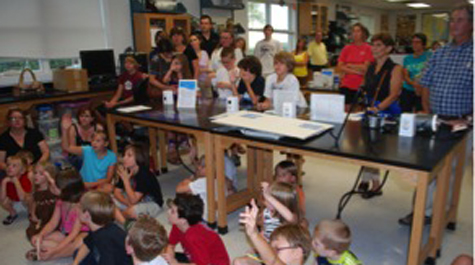Sarah McGuire receives an Informal Education Grant from MAMEA
The Mid-Atlantic Marine Education Association (MAMEA) awarded its 2012/13 Informal Education Project Grant to Sarah McGuire of the Chesapeake Bay National Estuarine Research Reserve in Virginia (CBNERR-VA). The grant was announced at the group’s annual conference on October 13, 2012 in Cambridge, Maryland. Ms. McGuire is the Education Coordinator for CBNERR-VA, located at the Virginia Institute of Marine Science in Gloucester Point, Virginia.
“The primary goal of the CBNERR General Education and Public Outreach Program is to increase awareness, understanding, appreciation, and responsible use of the Chesapeake Bay estuary through informal and formal education programs for K-12 and college audiences, teacher-training workshops, and programs for the general public,” explained McGuire. She coordinates several different education programs, including many field experiences for middle school students in nearby counties.
The grant will provide support for the popular CBNERR-VA Discovery Lab series. The monthly Discovery Labs provide educational science experiences in fun, family-friendly ways. Each lab focuses on a specific Bay-related topic through a series of hands-on activities for kids and adults. Participants use microscopes, observe live animals, make crafts or play games, even examine and discuss research posters. VIMS faculty, professional staff and graduate students contribute as speakers, sharing their cutting edge research with the general public in an intimate setting.
Each Lab can accomodate 100 participants and many families attend every session. One parent wrote that his three daughters look forward to attending each lab and they talk about them for weeks afterward. He reported that "Thanks to the Labs, they are learning how marine life affects people's lives every day. And, as a result of their experiences, they are talking about becoming marine scientists."
Thanks to this MAMEA Educational Project Grant, McGuire will be able provide the supplies and printed materials that support each lab, despite budget cuts from other sources. And, she plans to pilot expanded hours for the Labs, as well as test the potential of traveling lab boxes for local schools.
The Mid-Atlantic Marine Education Association represents marine science in the classroom, at research institutions, aquariums, museums and governmental agencies from North Carolina to Delaware. Membership is available for anyone interested in marine and acquatic education. For additional information, please visit the MAMEA website at www.mamea.org.

